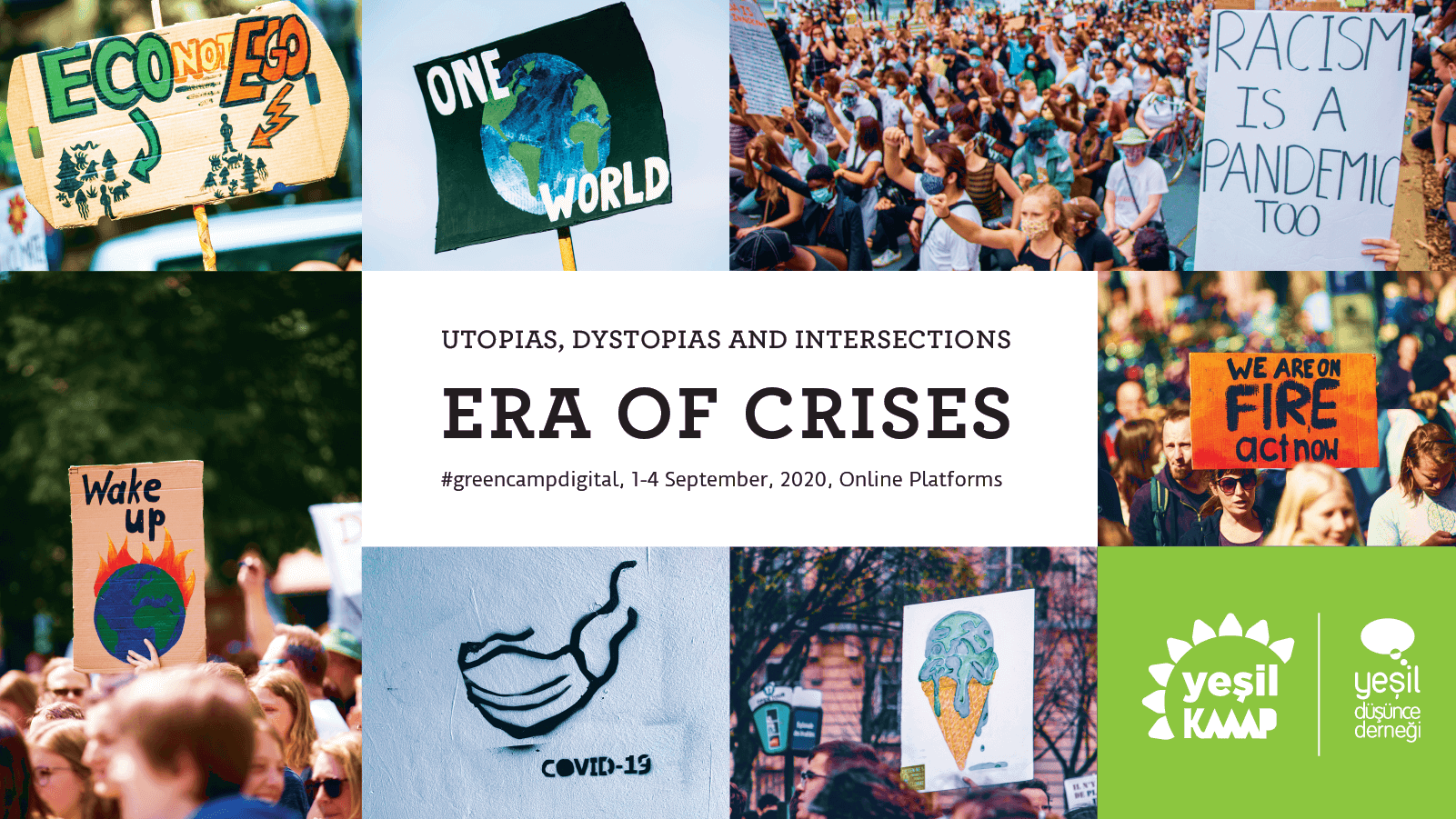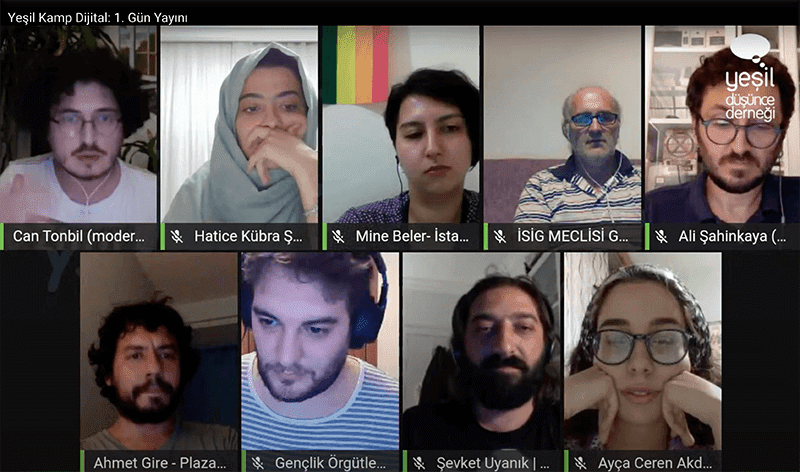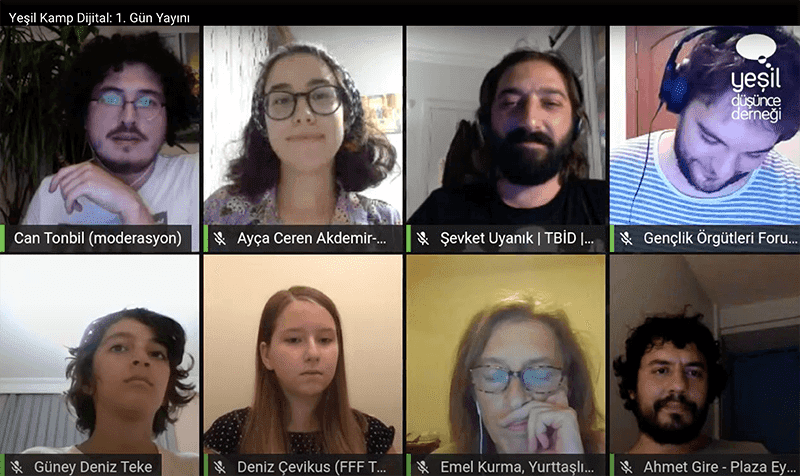Green Camp Digital – Era of Crises: ‘Utopias, Dystopias and Intersections’
Since 2009, Green Thought Association is organizing Green Camps to spread green ideas among participants, to discuss the current problems within the framework of green politics, to think, to find solutions, to share knowledge and experience. This year, Green Camp was organized on digital platforms with the title of ‘Era of Crises: Utopias, Dystopias and Intersections’
Green Camp digital took place on digital platforms between 1st and 4th of September due to Covid-19 pandemic. Panels and conversations, online music shows, online theatre, ballet and choreography shows met with the audience. Throughout the camp, in total 14 creative activists –independent and from 5 different art groups/collectives – participated the camp with their artistic creations. Total 38 guests from platforms that are working on women, LGBTI+, labor, climate, ecology, youth and citizen rights, spoke at panels and dialogue sessions. In another two workshops which were open to limited number of participants, total 6 volunteers and members of the Association worked as the prep team and total 30 participants were attended the workshops. Green Camp, although it was moved to digital platforms this year, it still worked as a networking and solidarity tool amongst its participants.
The first session of the Green Camp was a digital exhibition on Instagram about ‘Ecological Destructions and Examples from Struggles.’ We aimed to feature the ecological destructions and struggles; to bring the movements, their followers and our followers together; to create a similar solidarity atmosphere that we always create at offline Green Camps; and lastly to create an archive. For this activity, association members, volunteers, different NGOs and platforms and our instagram followers shared 21 posts for the exhibition. These posts were added to instagram stories and archived. (To access the archive, please visit : https://www.instagram.com/stories/highlights/17884300648705144/)
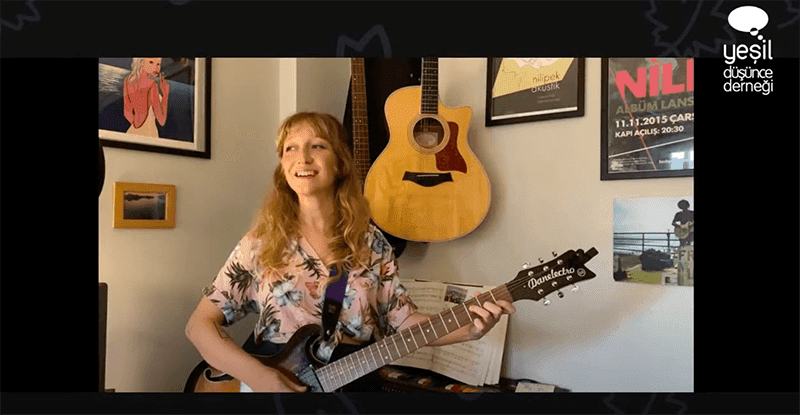
As the opening session, Nilipek greeted the camp participants with a concert and Tatavla Tiyatro performed their new theatre play online for the first time at Green Camp. The play was called ‘İnsan Çağı’ (Human Era) and it was directed by Eraslan Sağlam. It was focusing on the affects of climate crisis on children’s future. It promoted self-inquiry and search for solutions among the audiance. The play was suitable both for children and adults. It was also remarkable thanks to its ablity to show different perspectives of individuals on the issue of climate crisis and the struggle againts it.
Can Tonbil moderated a crowded panel named ‘Intersectionality and Meeting at Struggles’ where participants from different movements discussed how the Covid-19 crisis and climate crisis is affecting the world. They exchanged perspectives about how to find a common ground for these different struggles. (To watch the session, please visit: http://bit.ly/ykd-kesisimler). Among the speakers of this panel, there was Deniz Çevikuş and Güney Deniz Teke from Fridays for Future, Ali Şahinkaya from Extinction Rebellion, Çağlar Yenilmez from Youth Organizations’ Forum, Ayça Ceren Akdemir from Young Greens, Mine Beler from Istanbul LGBTİ+ Pride Week Team, Kübra Şamiloğlu from Havle Women Association, Emel Kurma from Citizens’ Assembly, Ahmet Gire from White Collar Activist Platform, Gökhan Turan from Workers’ Health and Safety Assembly, Şevket Uyanık from Common Knowledge and Communication Association.
The first day of the camp ended with a Fairy Tale Hour of Güneşin Aydemir (to see the recording of the session, please visit: http://bit.ly/ykd-masal ) In her narrative called Battlestar Galactica: Past in Future, Aydemir covered today’s problems by using the fiction called Battlestar Galactica. The connection between society and individuals, the communities’ responses to crises and utopian or dystopian results of these responses were covered. She finished her story with an emphasis on the vital cycle of good and bad.
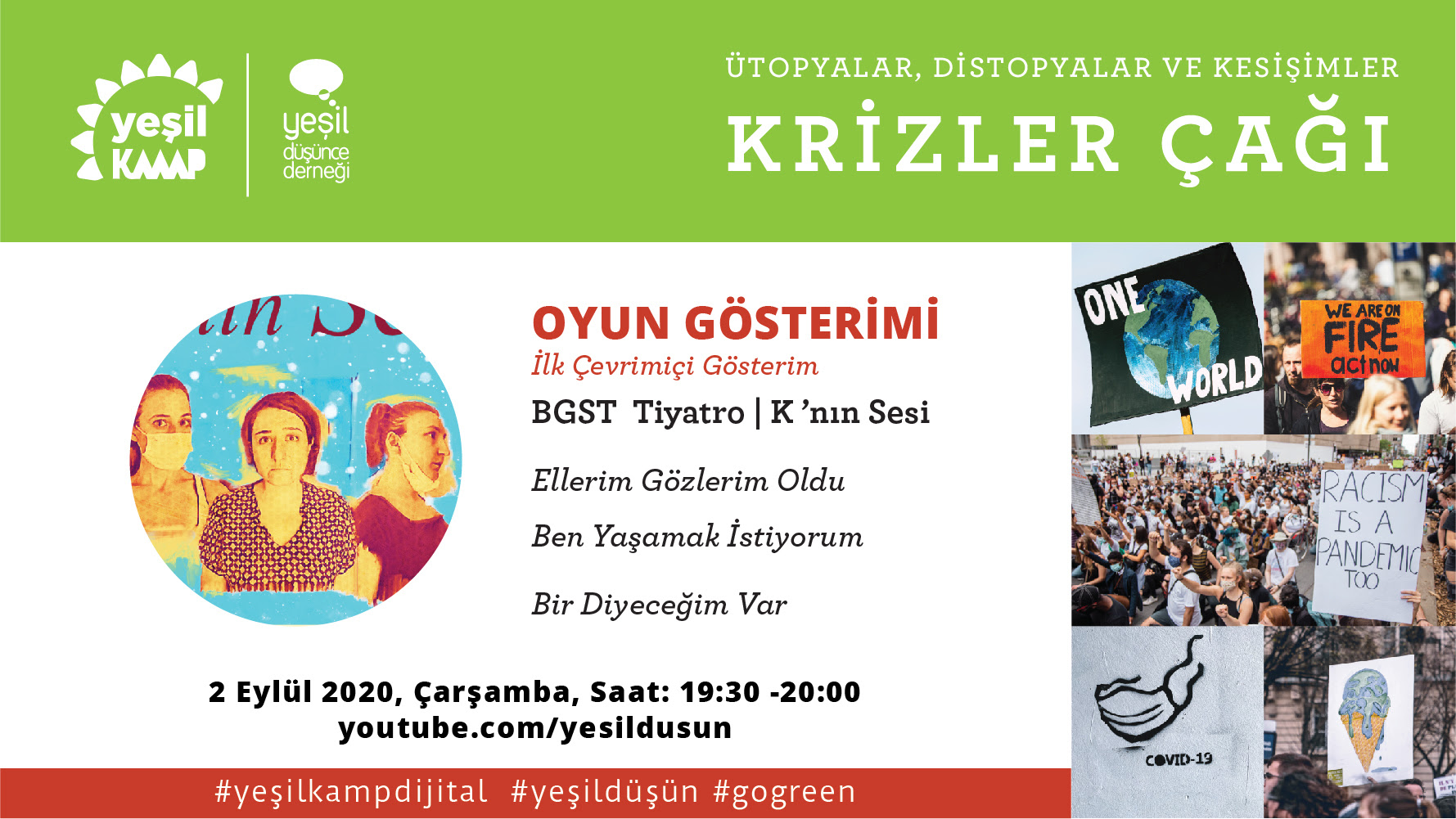
The second day of the camp started with a radio theatre play series called ‘K’s voice’. The play was written and directed by Duygu Dalyanoğlu and BGST Theatre actors were on scene. ‘Karanlık Gece’ vocalized by Duygu Dalyanoğlu, ‘Kendime Mahsus bir Odam Olsa’ vocalized by Maral Çankaya, ‘Herkes Nerede?’ vocalized by Ayla Algan met with the audience in the morning session. In the evening session, Zeynep Okan’s ‘Ellerim Gözlerim Oldu’ , Nihal Albayrak’s ‘Ben Ölmek İstemiyorum’ and Büşra Karpuz’s ‘Bir Diyeceğim Var’ theatre plays were broadcasted online for the first time. (https://www.youtube.com/playlist?list=PLD7IXR7KUu-pSEWplHoInxREbbm-rntxf). K’s voice series were presenting small sections from different women’s lives in which they face different problems during quarantine. They successfully showed how women were affected by Covid-19 crisis.
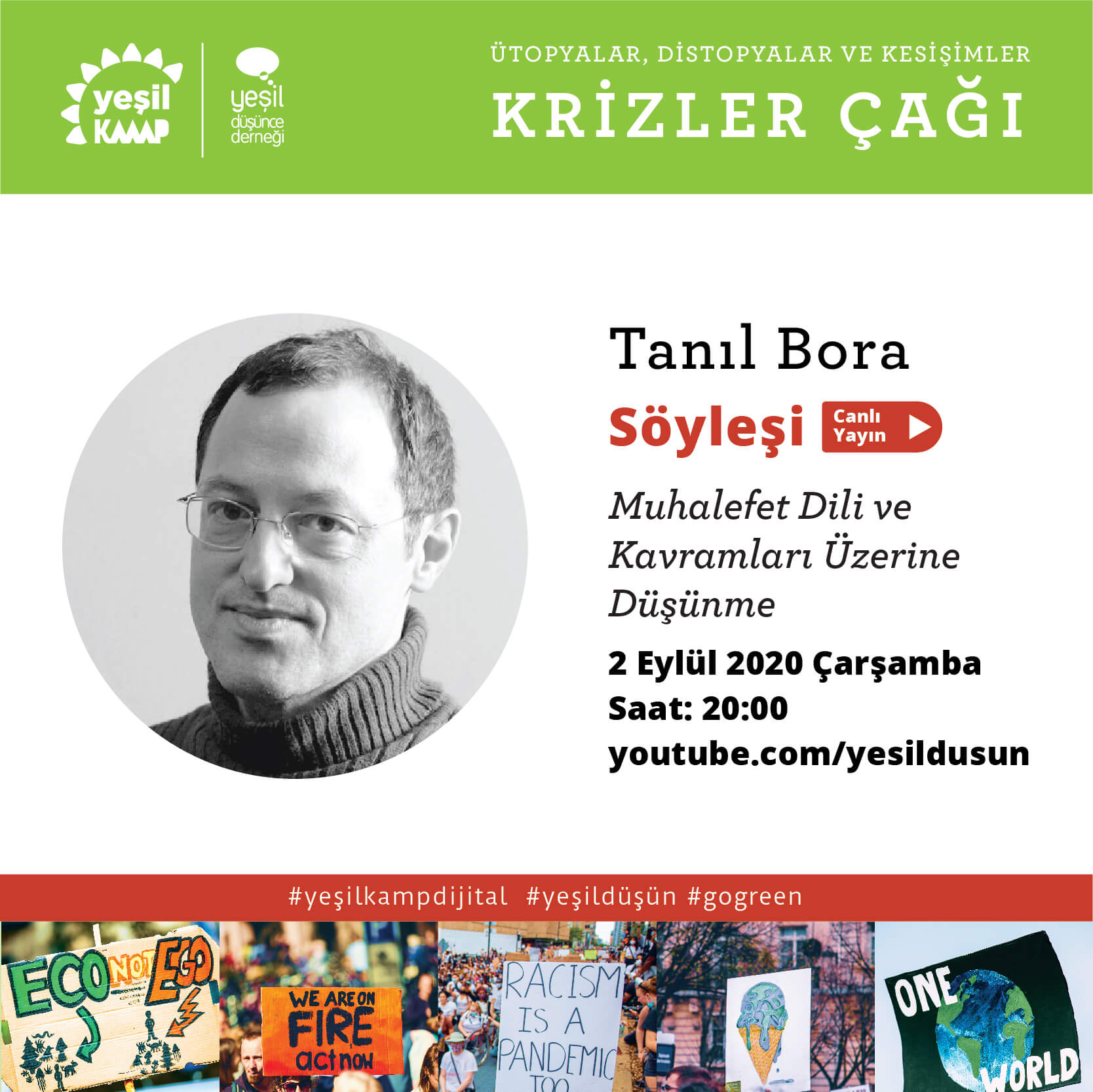
Author, political thinker, editor and translator Tanıl Bora was guest of Sevil Turan and Melisa Kutluğ in a dialogue session called ‘Thinking about Opposition Language and Terms’ . The session attracted a lot of attention from the audience. (to watch the recording please visit: http://bit.ly/ykd-tanilbora) The conversation started with following questions: ‘What bothers us in the current language? What are the structural problems of this language and how can we solve these problems and create alternatives?’. Throughout the conversation the speakers sought answers while discussing the current examples. At the beginning of the session, Tanıl Bora mentioned that his first published book was on green movement and that he has been thinking about it again for long time. He finished his speech by emphasizing the connection between the climate crisis, ecological destructions and pandemic. He added that this is a really good time for green movement to explain itself.
After the conversation with Tanıl Bora, Green Camp program continued with the final rehearsal of a dance choreography created by dancer-choreographer Patrick de Bana. Music for the performance was created by vocalist Aynur Doğan and pianist Salman Gambarov .
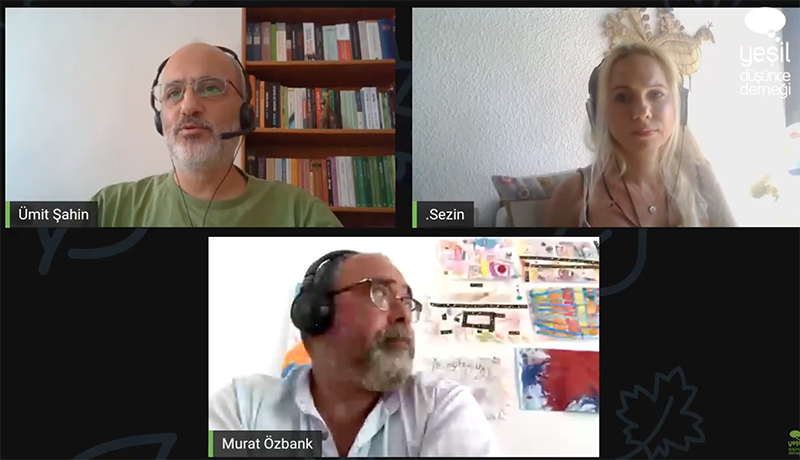
The third day of the camp started with a session moderated by Ümit Şahin. Şahin hosted Murat Özbank and Sezin Öney for a conversation on the topic of ‘Meeting of Utopias and Dystopias at Today’s Reality.’ At the conversation, speakers talked about how some progressive utopias of the past which triggered industrial and technological developments, created todays dystopian reality. In order to create a livable planet for all and to be able to get out of the crises, we need to get rid of both very optimistic and pessimistic point of views and start creating new politics based on rational solutions.
The day continued with a drawing performance called ‘Utopias and Dystopias’ and video performance called ‘Olamayız Artık Eskisi Gibi’ which reflects on our psychological states during quarantine. They were both creations of the artist Eymen Aktel. Musician Gökçe Coşkun met with the audience with a concert and shared her original music.
Green Thought Association’s volunteers and members Aylin Ezgi Yılmaz, Melisa Kutluğ and Rudi Sayat Pulatyan prepared and moderated a ‘Confronting Workshop’.
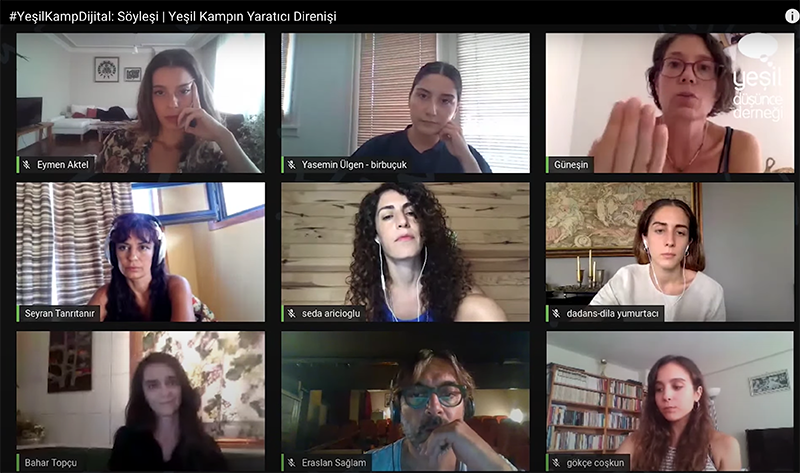
The last day of the camp started with a video performance created and filmed by Bahar Topçu. Ceylan Schumacher’s piano music accompanied Topçu’s video performance. It was followed by a session on ‘Green Camps’ Creative Resistance’ moderated by Bahar Topçu. The artists who participated the Green Camp with their art shared their thoughts on how crises are affecting the artists and what could be the possible solutions. (To access the session, please visit: http://bit.ly/ykd-yaraticidirenis).
Green Assembly members Gizem Kastamonulu, Onur Fidangül and Sema Alpan Atamer prepared and moderated a ‘Facilitation workshop’ on the last day of the camp.
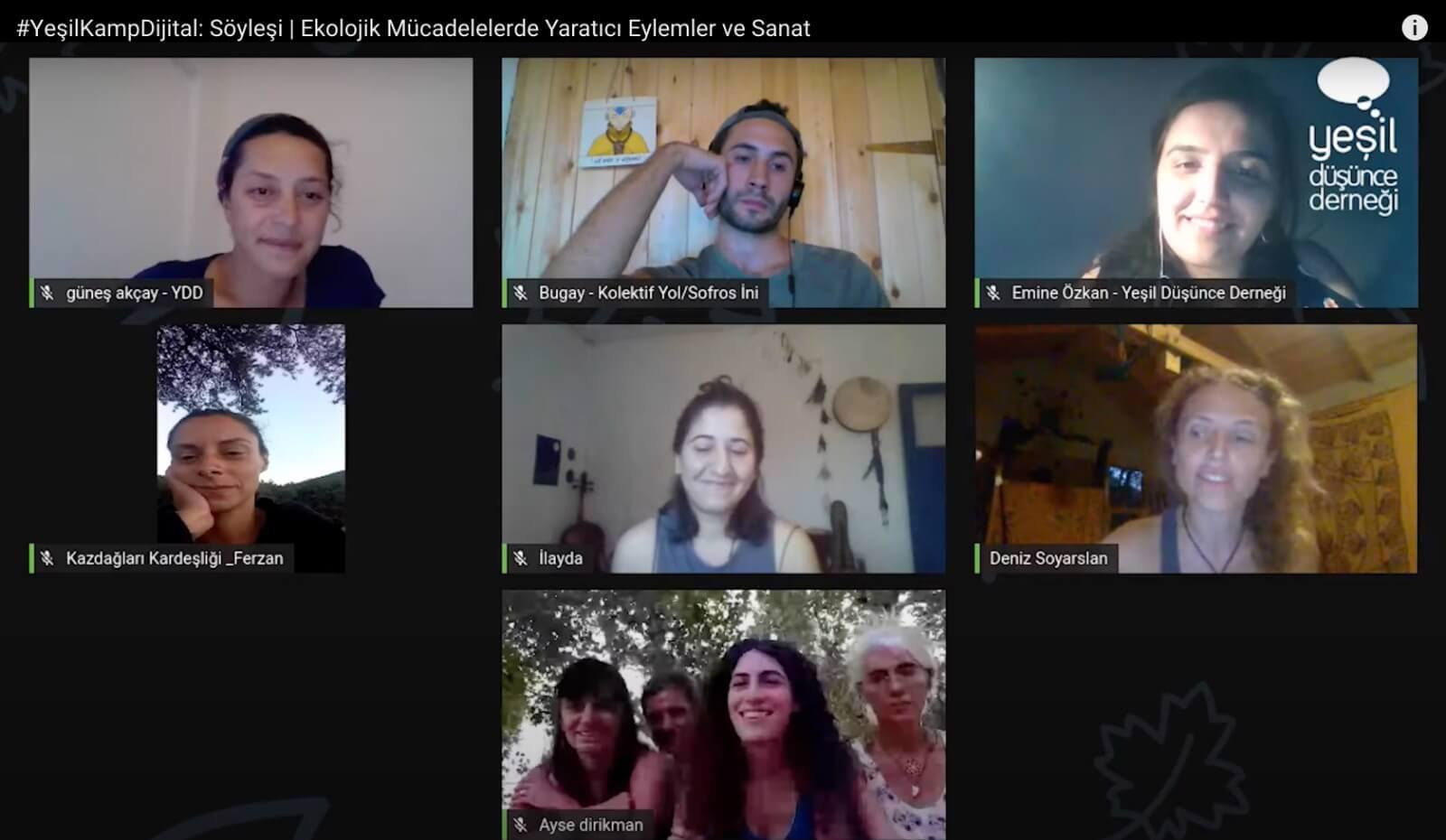
The closing session of the camp was a live stream chat with activists at Kazdağları watch from @KazdağlarıKardeşliği and activists at Ulupınar protecting the plane trees from @Ulupinarincinarlari. The camp was ended with a salutation to both these struggles. (to watch the session, please visit : http://bit.ly/kazdagi-ulupinar ) Ferzan Aktaş from Kazdağları watch site explained the story of the watch against gold mining and miners and talked about the new developments. She talked about the difficulties they faced during pandemic: most of the activists couldn’t come back from cities to join the watch and anybody trying to come to the camp site faced a penalty given by gendarme. During this time, the total amount of the penalties given to the activists is around 550.000 TL. İlayda Gülsüm Çamlı and Bugay Akyüz discussed how creative actions can develop and attract more attention. Deniz Soyarslan, who lives in Ulupınar and fights for plane trees, explained how the watch started there and the legal developments about the topic. He talked about the workshops, concerts and performances that they made to save the plane trees. Seda Arıcıoğlu, Ayşe Kalıpçı and Seyran Tanrıtanır who started a campaign to mark these planes as monumental trees and save them from being cut, joined and talked about how important saving these trees are and how their actions created so much attention where they live. In both places, the common problem is that the villagers can’t make their living form agriculture and livelihood anymore. This causes local population to seek employment elsewhere, either at the road constructions which will support tourism in Antalya or employment opportunities that the mine will provide in Kazdağları. The local communities are in a quandary of wanting to protect their lands and needing economic development.


